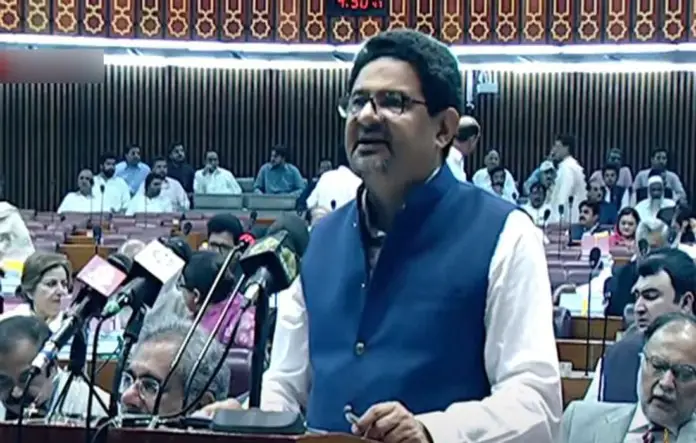The Pakistan Muslim League-Nawaz (PML-N)-led coalition government has presented what is being referred to as the “toughest federal budget” for the next fiscal year 2022-2023 with a total outlay of Rs9.5 trillion.
The budget comes amid tough conditions of the International Monetary Fund for the revival of the $6 billion loan programme that has been at a standstill for months over policy violations.
While presenting the budget in the National Assembly, Finance Minister Miftah Ismail chastised the “incompetent” Pakistan Tehreek-e-Insaf (PTI)-led government for its poor performance.
The minister pointed out that the current budget focused on “inclusive” and “sustainable” growth.
Ismail blamed the previous government’s “incompetency” for the inflation currently faced by the country. He added that the PTI government’s incompetence had made Pakistan the third-most expensive country.
While stating that the government had to achieve sustainable growth, Ismail said that the growth target for the next year was set at five percent.
Salient Points
- FBR to collect Rs7,400 billion, while provinces to collect Rs4,100 billion
- Net revenue for federal government projected to be at Rs4,904 billion
- Proposal for increase of BISP’s allowance from Rs250 billion to Rs364 billion
- 10 million children to benefit from Benazir Taleemi Wazaif programme
- Rs65 billion allocated for HEC
- Rs73 billion allocated for arrears payment of petroleum sector
- No income tax on individuals earning up to Rs100,000 a month
- Drop from 10 to 5% proposed for tax on Behbood Saving Certificate and Pensioners Benefit Account
- Budget for health sector to be Rs24 billion
- Rs21 billion allocated to agriculture
The finance minister pointed out that whenever the growth rate moved up to 5-6 percent from 3-4 percent, the current account deficit went out of control because of the prioritisation of the elite and the increased focus on imports to facilitate them.
The minister stated that a new way was needed that could improve the conditions of the lower-income sections to increase domestic production.
The finance minister gave the assurance to the house that the coalition government would manage to pull the country out of the crisis it was in.
Ismail also said that in the next fiscal year, the economic situation of the poor would be made better through the provision of facilities to them.
He elaborated that a rise in the income of the poor resulted in them purchasing locally-produced consumer goods which led to a reduction in exports and put the development process on track. This, he added, was how inclusive growth could be attained.
While explaining the rationale behind this year’s budget, Ismail said that agricultural production would be increased to push up arable produce and increase the per acre yield amid a focus on development of industries that could increase exports.
The finance minister apprised his fellow lawmakers that Prime Minister Shehbaz Sharif aimed to provide maximum relief to the country, especially those who could not tolerate the increasing inflation. For this purpose, he added, the government would be providing subsidies.
While shedding light on the federal budget for the next fiscal year, Ismail stated that the aim of the Federal Board of Revenue would be to collect nine percent or Rs7,400 billion, while the provinces would be requested to collect Rs4,100 billion.
Moreover, the net revenue for the federal government has been projected to be at Rs4,904 billion, non-tax revenue at Rs2,000 billion, and expenditure at Rs9,502 billion.
The finance minister informed the lower house that Pakistan would be spending Rs3,950 for debt servicing, while taxes imposed on non-filers had been proposed to be increased from 100 to 200 percent.
Meanwhile, the total expenditure for interest payments for the next year has been estimated at Rs3,950 billion as opposed to this fiscal year’s Rs3,144 billion.
Ismail said that in the current (outgoing) fiscal year, public debt would be at 72.5 percent of the GDP – Rs44,365 billion in March 2022.
The tax revenue of the FBR for the outgoing fiscal year was projected at Rs6,000 billion, with the contribution of the provinces standing at Rs3,512, and the Centre’s net revenue at Rs3,803 and non-tax revenue at Rs1,315.
Moreover, the total expenditure of the federal government in the outgoing fiscal year has been estimated at Rs9,118 billion, and the Public Sector Development Programme (PSDP) at Rs550 billion, the finance minister said.
The tax rate for purchasing property should be 5 percent for non-filers, and for filers, the rate of advance tax on buying and selling should be increased from 1 to 2 percent.
Welfare programmes
For the upcoming fiscal year, a proposal of an increase of Benazir Income Support Programme’s allowance from Rs250 billion to Rs364 billion has been made. The finance minister stated that nine million families would get money via the Benazir Kafalat Cash Transfer Programme, for which Rs266 billion has been proposed.
The subsidy for the Utility Stores Corporation has been proposed to be increased to Rs12 billion.
Under the Benazir Taleemi Wazaif programme, 10 million children will benefit, for which Rs35 billion has been allocated. The finance minister added that more than 10,000 students would receive undergraduate scholarships and Rs9 billion has been allotted for it.
Moreover, the Benazir Nashonuma Programme would be extended to all the provinces with its fund allocation increasing to Rs21.5 billion.
For the medical treatment of needy people, Rs6 billion will be allocated from Bait-ul-Maal.
Higher education
An amount of Rs65 billion has been allocated for the Higher Education Commission (HEC), along with Rs44 billion for HEC’s development projects.
Energy sector
Ismail said that Rs73 billion had been allocated for arrears payment of the petroleum sector, while the gas rate for the industrial sector was to be announced.
He added that Rs214 billion had been earmarked for additional subsidies in the first three months so that the burden of the last government’s policies was not borne by the masses.
He further apprised the lawmakers that it had been proposed that Rs570 billion be allocated for this sector so that people had electricity supply at their homes and the heat became bearable for them.
Imposition of taxes
Miftah stated that the income tax threshold (per year) had risen from Rs600,000 to Rs1.2 million, adding that this meant there would be no income tax on individuals earning up to Rs100,000 a month.
The finance minister said that it had been suggested by the government that tax on banking companies be increased to 39%, including 42% super tax, and foreign businessmen in Pakistan would also have to pay taxes.
Ismail also proposed that the tax rate for non-filers purchasing vehicles with engine capacity greater than 1,600cc be increased from 100 to 200 percent.
An advance tax has also been proposed on 1,600 cars while a 2% additional tax has been proposed for electronic engine cars.
Moreover, a drop from 10 to 5% has been proposed for tax imposed on Behbood Saving Certificate and Pensioners Benefit Account.
Small scale retailers would now have a fixed tax imposed on them, ranging from Rs3,000 to 10,000, that would be collected through electricity bills.
Moreover, it has also been proposed that filers sending money abroad through credit, debit or prepaid cards would have to pay 1% withholding tax, while non-filers would pay 2%. This tax could be adjusted later, Ismail stated.
Ismail also proposed that families which used less than 200 units of electricity would be provided with loans on easy instalments to purchase a solar panel.
Health
The finance minister announced the proposed budget for the health sector to be greater than Rs20 billion, a reduction owing to the fact that the previous government had allocated more budget to health due to the COVID-19 pandemic.
The budget for the sector would be Rs24 billion, the finance minister added.
Agriculture
Ismail informed the National Assembly that the government would be allocating Rs21 billion to the sector, which would help increase the output of the sector.
Moreover, he added, the Ministry of National Food Security and Research had come up with a growth strategy for the next three months to help the provinces and planning commission.
Ismail added that the strategy was aimed at the prosperity of farmers, dealing with changing weather, promotion of ‘smart’ agriculture, along with value addition, self-reliance and agro-processing.







